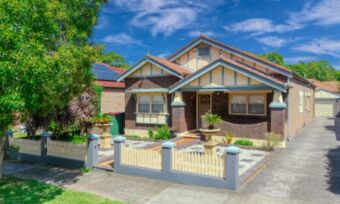Non-resident home loans
The Australian property market may be an appealing investment opportunity, but can you obtain a mortgage in Australia if you’re a non-resident?

The Australian property market may be an appealing investment opportunity, but can you obtain a mortgage in Australia if you’re a non-resident?
Can a non-resident apply for a home loan in Australia?
If you’re wanting to buy into the Australian property market as a foreign investor, non-permanent resident or foreign national moving to Australia, you may be wondering if you’re able to obtain a home loan from an Australian lender.
The short answer is yes, but there are a number of rules and regulations foreigners have to navigate through when purchasing property in Australia. Here we take a look at non-resident home loans (also referred to as foreigner mortgages) for foreign nationals and non-permanent residents.
What are non-resident home loans?
Non-resident home loans are exactly as they sound mortgages for those who are not citizens or residents of Australia. While most lenders only provide loans to Australian citizens and permanent residents, a select few lenders do cater to non-residents such as foreign investors or temporary residents. Although some banks may provide non-resident home loans, you will typically find that most are non-bank lenders, which are financial institutions that are not classified as authorised deposit-taking institutions (ADIs).
Non-resident loans will generally have stricter approval criteria than regular home loans such as a higher deposit, proof of funds and income in an acceptable currency. Non-resident mortgages will usually have higher interest rates as well, but otherwise have the usual options of a regular property loan (such as a fixed rate, variable rate or split rate loan options). Interest only loans may also be available, but often come with maximum term limits (e.g. five years).
What are the requirements for a non-resident home loan?
Before you can apply for a home loan as a non-resident, you must be granted permission to purchase property in Australia from the Foreign Investment Review Board (FIRB), a government body established to manage inbound foreign investment in Australia. You are exempt from needing approval from FIRB if you are one of the following:
- An Australian citizen (including expats living overseas).
- A New Zealand citizen.
- An Australian permanent visa holder.
- A foreigner buying property as joint tenants with a spouse who belongs to one of the above groups.
Rules implemented by the FIRB essentially limit non-residents to properties that are:
- New dwellings: properties that have not been previously sold as a dwelling or have not been previously occupied. If the developer sold the investment property, it must not have been occupied for more than 12 months.
- Vacant land: a property must be constructed within four years of the FIRB approval date.
While non-residents are generally not allowed to purchase properties with an established dwelling, temporary residents may be permitted as long as they sell it when they leave the country.
Another exception is a property that you plan to redevelop, but FIRB will only give approval if the original dwelling is redeveloped into two. So the approval for an established property purchase is subject to the condition that more than one property has to be built.
Should non-residents not adhere to the rules set out by FIRB, they could face serious penalties such as fines or even criminal charges.
Learn more: What are the rules on foreign investment in Australia’s property market?
What is the application process of a non-resident home loan?
Outside of gaining permission from FIRB, the application process for a non-resident home loan can be much the same as the usual way to apply for a home loan in Australia.
While you can always search for a lender on your own, you can also seek a mortgage broker that specialises in non-resident home loans.
Like any loan application process, lenders will require several documents from you. The documents that will generally be asked for include:
- Proof of identification (usually a passport and visa if applicable).
- Proof of income (such as payslips or bank statements).
- Proof of deposit funds.
- Any existing loans or debts (such as other loans or credit cards).
- Credit history.
- Details of the property you wish to purchase.
How much deposit do I need for a non-resident home loan?
The deposit required for a non-resident home loan will depend on the lender you choose, and the Loan-to-Value Ratio (LVR) they offer to non-residents. You can generally expect the LVR to be lower for a non-resident loan. In other words, the amount you can borrow is typically less with a non-resident home loan.
The lower the LVR is, the higher the loan deposit will be. For example, if the LVR is 70%, you will need to provide 30% of the property value for the deposit, and 40% for a 60% LVR.
Other non-resident home loan costs to consider
Additional costs outside of the the FIRB application fees and loan deposit include:
- Stamp duty costs, including any surcharges for the foreign buyer duty.
- Property inspection fees, including building and pest inspections.
- Land title and registration fees.
- “Ghost tax”, which is a minimum $5,000 per year levy if you fail to occupy or lease out your property for at least six months per year.
Can I get a home loan in Australia as an Australian living overseas?
Yes, most Australian lenders will provide home loans to Australian citizens living overseas. But unlike those living in Australia, there are typically extra requirements and conditions for Australian expats obtaining a mortgage in Australia.
If you wish to take out a joint loan with a foreign spouse, however, not all lenders will accept their income and you may have to purchase the property solely in your name. Even if you are able to take out a joint loan, you will have to pay the Foreign Buyers Duty, which can potentially double your regular Stamp Duty costs.
Can a non-resident business owner buy property in Australia?
If you are self-employed, then it is possible to be accepted for a home loan in Australia, but it can be a lot more difficult. This is due to the fact that your income will need to be verified by your mortgage broker and/or lender, and in some cases as a foreign business owner, this isn’t possible. If more than 25% of your income is derived from your business, you’ll be more than likely classified as self-employed.
Generally speaking, you’ll have a better chance at home loan approval if you can provide the necessary information in regards to what country you’re from, your income, the currency of said income, your living expenses and your credit history, as well as by supplying tax returns that are easy to read and understand.
Cover image source: Amnaj Khetsamtip/Shutterstock.com
Additional reporting by Nick Whiting.
This article was reviewed by our Senior Finance Journalist Alasdair Duncan before it was updated, as part of our fact-checking process.

Karen is the Senior Content Production Specialist at Canstar, working to help the company produce informative yet easy-to-digest financial content for Australian consumers. Karen has a background in allied health, having completed a Bachelor of Podiatry from the Queensland University of Technology.
Karen embarked on a second career to rekindle her childhood passion for writing, while still maintaining her earnest intentions from her health professional background — to help the general public. In 2023, she completed a Graduate Certificate in Writing, Editing and Publishing at the University of Queensland. Karen strives to bring a fresh perspective and accurately represent the average consumer.
You can connect with Karen via Linkedin.
- Can a non-resident apply for a home loan in Australia?
- What are non-resident home loans?
- What are the requirements for a non-resident home loan?
- What is the application process of a non-resident home loan?
- How much deposit do I need for a non-resident home loan?
- Can I get a home loan in Australia as an Australian living overseas?
- Can a non-resident business owner buy property in Australia?
The comparison rate for all home loans and loans secured against real property are based on secured credit of $150,000 and a term of 25 years.
^WARNING: This comparison rate is true only for the examples given and may not include all fees and charges. Different terms, fees or other loan amounts might result in a different comparison rate.
 Owner occupied
Owner occupied
 20% min deposit
20% min deposit
 Redraw facility
Redraw facility
Try our Home Loans comparison tool to instantly compare Canstar expert rated options.





